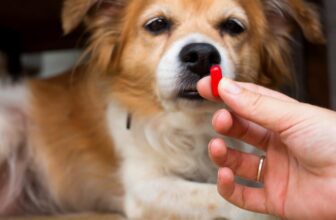
Check out our latest products
Support your dog or cat’s mental and emotional well-being by recognizing behavioral issues, reducing stress, and promoting a happy, balanced life with enrichment, routine, and nutrition.
Mental health in dogs and cats is just as important as their physical health. These intelligent, emotional beings experience stress, fear, joy, and sadness much as we do. Understanding your dog or cat’s mental and emotional needs helps you ensure she leads a happy, healthy, and fulfilling life.
Signs of mental and emotional problems in dogs and cats
A mentally and emotionally healthy dog or cat behaves in a manner appropriate for her species. She is content in her environment, interacts positively with people and other animals, and is free from chronic stress.
Conversely, if a dog or cat is mentally unwell, she might exhibit anxiety, depression, or compulsive behaviors. These conditions can impact how your animal eats, sleeps, socializes, and functions on a day-to-day basis.
Significant behavior changes warrant attention. These can include increased aggression or fearfulness, shyness, destructive behavior, or sudden lack of obedience. The dog or cat might stop eating or vocalize excessively. You could also notice a change in her grooming, social, or toileting habits.
“A mental or emotional condition in a pet is a behavioral issue where the pet expresses ‘big feelings’ in unwanted ways,” says Dr. Valli Parthasarathy of Synergy Veterinary Behavior. “These behaviors may significantly affect their welfare or that of their family.
“Underlying stress, anxiety, or fear often cause these behaviors. As such, we consider the emotional state of the pet as we look at options for treatment.”
What causes mental health issues in dogs and cats?
- Anxiety is one of the most frequently observed mental health issues in both dogs and cats. A dog may panic when left alone or exhibit fearful behavior around other animals. A cat may develop generalized anxiety or fear when exposed to new situations or changes in the household.
These problems are especially common in animals whose caregivers didn’t provide appropriate socialization during early life.
- Dogs and cats may suffer from depression as well. Signs include withdrawal or hiding, not eating, excessive sleeping, or lack of interest in their usual activities. The loss of a human or animal companion may cause depression, as can significant life changes or chronic illness.
- Less common, but also seen in both dogs and cats, are obsessive-compulsive disorder (OCD), cognitive dysfunction syndrome (CDS), and post-traumatic stress disorder (PTSD).
- OCD often manifests in behaviors such as excessive tail-chasing or paw-chewing. Your cat might pace or vocalize excessively or engage in disproportionate grooming or sucking.
- CDS is a form of dementia that primarily affects older animals. The dog or cat could become disoriented, experience changes in her sleep cycle, show reduced interest in her surroundings, or begin to have accidents.
- PTSD in dogs and cats can stem from neglect or trauma. They may become hypervigilant, avoidant, or exhibit uncharacteristically aggressive behavior. They could also experience heightened startle responses or marked panic attacks.
Common stressors can lead to mental health problems
- “Consider any recent changes in your pet’s environment or routine, as these can be major stressors,” says veterinarian Dr. Lilian Wong.
“Has a new family member, animal, or baby recently joined the household? Have your work hours changed, or have you been traveling more? Even subtle shifts in routine can have a big impact on your dog or cat’s behavior.”
- Early-life experiences can also influence a dog or cat’s temperament and behavior. These include improper socialization or trauma during development.
- Other factors include environmental disruptions such as a lack of stimulation or exercise, inconsistent routines, or living in a loud or chaotic environment.
- And certainly not least, thyroid imbalances and other physical illnesses can trigger anxiety or aggression. Your veterinarian should always be your first line of defense if you suspect a mental or emotional disorder in your dog or cat.
How to help a dog or cat with a mental health disorder
It’s important to work with your vet or an animal behaviorist if your dog or cat is having mental or emotional health problems. They can assist you in getting to the root of the issue and provide ways to help your four-legged friend feel better.
“Depending on the root cause of behavioral issues, natural options such as nutritional supplements, prebiotics and probiotics, positive reinforcement training, and counter-conditioning play a significant role in supporting behavioral and physical health,” says Dr. Wong.
- Counter-conditioning and desensitization can help with anxiety-related behaviors. These techniques teach your pet to associate a positive outcome with what triggers her anxiety. For example, if you give her a treat when the doorbell rings, she will learn to associate the event with a positive reward.
- Positive reinforcement training and routine building can build confidence and create a sense of security, whether you use treats or not. Your dog or cat will become accustomed to the offending event and learn that nothing bad happens as a result of that trigger.
For emotional health, whether or not your animal has preexisting issues, it is essential to establish consistency in her daily routine. “Pets with behavioral conditions often thrive on consistency because they feel more comfortable knowing what is going to happen next,” says Dr. Parthasarathy.
- Environmental enrichment is essential to your dog or cat’s emotional well-being. Make sure your dog has toys and/or puzzle feeders to keep him occupied. Give her daily walks, regular playtimes, and training sessions.
For kitties, a cat tree or condo can serve the same purpose. Ensure your dog has quiet rest areas and your cat a safe hiding spot. These options give her a break from situations that increase her stress.
“There are many forms of enrichment, and what is best for a pet depends on the species and individual,” adds Dr. Parthasarathy. “For example, enrichment can include foraging, as with interactive food toys, as well as social and play times.
“Enrichment can help reduce anxiety by providing pets with a safe and positive way to engage with their environment. Taking the individual into account is important because social interactions with strangers may be very enriching for one animal, but not for another.”
- Good nutrition that supports mental and emotional well-being is crucial. Foods such as turkey, fatty fish, and sweet potatoes can have calming effect on a dog or cat. For more about these foods and others, turn to page xx.
- Medications or supplements may be prescribed by your vet in extreme cases. These might include SSRIs or anti-anxiety drugs, pheromone therapy, or nutraceuticals such as CBD (under vet guidance).
Studies show that Omega-3 fatty acids, among other supplements, support brain health and contribute to reduced anxiety.
Persistent behavior changes in your dog or cat could signal a mental or emotional health issue. If she shows ongoing destructive behavior, fear, or withdrawal, consult an expert promptly.
Start by consulting a veterinarian to rule out physical health problems. With the help of your vet and an animal behaviorist, you can usually work toward a satisfactory outcome for most of these problems.
Don’t overlook mental health in dogs and cats. Empathy, patience, and proper support can help her cope with or overcome these challenges and get back to her happy, healthy self.
Tips for preventing mental health issues
Not all mental and emotional health issues are preventable, but certain common-sense measures can reduce the risk significantly.
- Early socialization and positive exposure to people, places, and other animals will help a puppy or kitten feel secure in any situation.
- Gentle handling and exposure to situations like grooming and vet visits are also key to emotional health.
- For adult animals, always maintain a stable routine, avoid punishment or harsh training techniques, allow for sufficient exercise, and ensure their basic medical needs are met.
Are some breeds more susceptible than others?
Certain breeds are more prone to mental health issues than others. For example, Border Collies and German Shepherds may be more “hyper” or anxious. Siamese cats are renowned for being more vocal than other breeds. The bottom line here is to know your animal and what is normal for her.
Post Views: 21
Linda Caradine is a Portland, Oregon-based writer and the Executive Director of Other Mothers Animal Rescue, founded in 2005 to give pregnant dogs and cats a second chance at a good life. Linda’s work has appeared in a variety of publications, and she is currently working on a book about starting and running her rescue organization.



![[PETHROOM] Cat Nail Clipper Trimmer for Indoor Cats with Circular Cut Hole (2mm) | Premium Sturdy Stainless Steel Blade Cat Claw | Safe, Easy, Accurate, Quiet & Fast | Avoid Overcutting](https://m.media-amazon.com/images/I/6156hi88deL._AC_SL1298_.jpg)
![[PETHROOM] Professional Eye Comb for Pets | Stainless Steel Tear Stain Remover for Cats & Dogs | Gentle Round-Head Grooming Tool | Compact & Portable for Eye Gunk Removal](https://m.media-amazon.com/images/I/71+W758uwXL._SL1500_.jpg)









